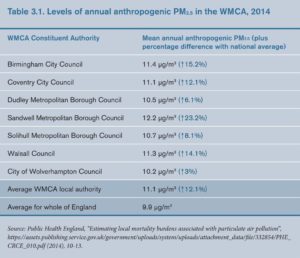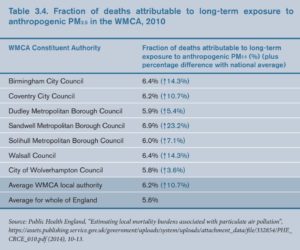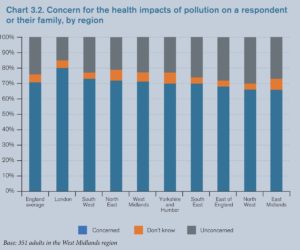Ambitious intentions
When Andy Street was campaigning to become elected as Mayor of the West Midlands Combined Authority (hereafter the WMCA, which is an agglomeration of the seven councils in the West Midlands), improving transport in the region featured prominently in his manifesto. This should not be surprising, given the extent of powers which the Mayor has over transport policy. Interestingly, on numerous occasions he both implicitly and explicitly made reference to the need to use these such powers to tackle air pollution in the region.
Whether it was ‘busting congestion’, improving the cleanliness of bus engines, or ‘supercharging cycling and walking’, Street made an unabashed statement of intent to confront the WMCA’s poor air quality head on. And for good reason.
Extent of the issue
Research published today by Bright Blue in our policy report, Clearing the air: reducing air pollution in the West Midlands, shows that the West Midlands is particularly afflicted by air pollution relative to other parts of the country, including other major urban metropolises – such as Greater Manchester and the Liverpool City Region. The consequences of this inferior air quality play out most vividly in terms of lower health outcomes for residents of the West Midlands who are forced to breathe in excessively high toxic fumes and particulate matter.

Indeed, we found that people in the WMCA typically suffered from higher rates of preventable respiratory and cardiovascular diseases – which are both linked with elevated levels of air pollution. Air pollution is also associated with other serious conditions, including dementia and cancer. But most starkly, excessively poor air quality can even result in premature death. In the West Midlands, we found that nearly 1,500 people were dying early because of fine particulate matter in the air. Altogether, rates of deaths associated with fine particulate matter were over 10% higher in the West Midlands than the rest of England, but in some local authorities the rate was even greater, such as for Sandwell Metropolitan Borough Council at 23.2%.

Pollution polling
For this research, we also carried out opinion polling. As can be seen in Chart 3.2, from a sample of adults living in the West Midlands, we found that 72% are ‘concerned’ about the impact of air pollution on the health of themselves and others – making them marginally more concerned than the population of the UK at large.

In addition, we found that very few adults resident in the West Midlands think that current Government measures are sufficient to tackle air pollution – a mere 12% think enough is already being done.
Clearly, improving air quality in the West Midlands will take a number of different measures. Responsibility will have to be shouldered by lots of different actors – including different tiers of government, individuals, and companies. Concluding our report, we made several suggestions which could help the overall effort of tackling air pollution in the region.
Clearing the air
First, we recommend that the clean air zone due to be introduced in Birmingham City Centre for 2020 – which charges the most pollution vehicles to drive in it – should be widened across the WMCA, to those parts which suffer from the highest concentrations of air pollutants. The Government itself acknowledges clean air zones as one of the best ways of tackling emissions, and evidence from London suggests that they do indeed incentivise the adoption of cleaner vehicles and less polluting modes of transport – such as cycling, walking, and public transport. Importantly, we recognise that this could impose costs on the least well off in society and vulnerable groups who rely on their cars to get around. Therefore, sufficient exemptions should be attached to the new clean air zones to ensure they are not regressive or restrictive in terms of human freedom.
Second, we think that the law which prevents local and combined authorities from pursuing ‘reasonable profits’ from clean air zones should be amended so that they can. However, any reasonable profits generated should be directed to fund measures which actively reduce air pollution (such as charging points for electric vehicles, or a diesel scrappage scheme).
Indeed, this brings us to another of our recommendations – the establishment of a local scrappage scheme for diesel vehicles. It would be up to the WMCA as to what price the grant was set at (although £1,300 could be a good guide), and what conditions should be applied to what the grant can be spent on. Beneficiaries from the scheme would need to have scrapped a diesel vehicle which they had owned for at least 12 months.
Lastly, we argue that the licensing of taxis should be carried out by the WMCA, rather than the constituent local authorities, as the case currently is. Beyond this, we recommend that licensing should be linked to vehicle emissions standards. Specifically, the WMCA should mandate that the age limit for already licensed solely fossil fuel vehicles is set at 10 years, in order to prevent the oldest models from remaining on the road. For solely fossil fuel vehicles seeking to be licensed for the first time, the age limit should be set at 18 months. The WMCA should set a date after which all new vehicles presented for taxi and PHV licensing should be zero emission capable.
In the report, we also make a handful of other recommendations, however we believe the four cited above are the most ambitious and will result in the biggest gains to air quality in the WMCA.
Conclusion
Poor air quality is a public health challenge with deadly consequences. Government, therefore, has a right, and indeed a duty, to step in where appropriate. We know that the residents of the West Midlands are concerned about air pollution, but only a fraction think enough is being done to solve it. Andy Street came to power promising strong action on dirty air, and to his credit has made progress since being elected. But he can and should go further. Adopting the policies detailed in our latest report would be a step in the right direction for cleaner air, and a healthier West Midlands.
Notes
- The respondents polled in the West Midlands were drawn from the ‘West Midlands region’, which is distinct from just the WMCA
- The full data tables for the public opinion polling can be found here
- We gratefully acknowledge the support of the European Climate Foundation for this project
- We are grateful to Opinium for advising on and carrying out the survey, and for their comments on our analysis
Eamonn Ives is a Researcher at Bright Blue. The full copy of Clearing the air: reducing air pollution in the West Midlands can be found here.


